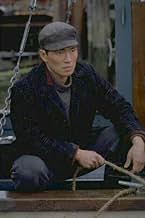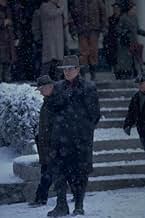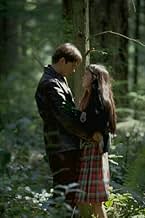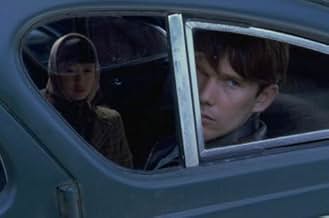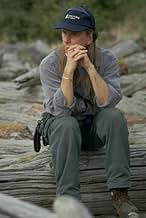IMDb RATING
6.7/10
15K
YOUR RATING
A Japanese-American fisherman is accused of killing his neighbor at sea. In the 1950s, race figures into the trial. So does reporter Ishmael.A Japanese-American fisherman is accused of killing his neighbor at sea. In the 1950s, race figures into the trial. So does reporter Ishmael.A Japanese-American fisherman is accused of killing his neighbor at sea. In the 1950s, race figures into the trial. So does reporter Ishmael.
- Nominated for 1 Oscar
- 5 wins & 11 nominations total
Max von Sydow
- Nels Gudmundsson
- (as Max Von Sydow)
Yûki Kudô
- Hatsue Miyamoto
- (as Youki Kudoh)
Daniel von Bargen
- Carl Heine Sr.
- (as Daniel Von Bargen)
- Director
- Writers
- All cast & crew
- Production, box office & more at IMDbPro
Featured reviews
Snow Falling on Cedars
Nominated for best cinematography, this film deserved to give American Beauty a better run for its money. Sadly savaged by many critics, who seemed to fail to grasp the depth of the story and the beauty with which it was told because they were too busy analyzing the parts. Snow Falling on Cedars follows a mixed race love that is complicated by the onset of war. The reactions of the two principle characters betrays not only how human love can transcend itself into something greater but how those involved can find fulfillment in themselves through its sacrifice. The exquisite symbolism (you could write a book on the different things snow could symbolize after watching this) is never overplayed - in other words, the viewer can enjoy the film as entertainment without having "deeper meanings" rammed down their throat - but they are there in abundance, from the way the scenery is developed to small details such as the main character's name ("Ishmael" - meaning "He whom God hears").
Nominated for best cinematography, this film deserved to give American Beauty a better run for its money. Sadly savaged by many critics, who seemed to fail to grasp the depth of the story and the beauty with which it was told because they were too busy analyzing the parts. Snow Falling on Cedars follows a mixed race love that is complicated by the onset of war. The reactions of the two principle characters betrays not only how human love can transcend itself into something greater but how those involved can find fulfillment in themselves through its sacrifice. The exquisite symbolism (you could write a book on the different things snow could symbolize after watching this) is never overplayed - in other words, the viewer can enjoy the film as entertainment without having "deeper meanings" rammed down their throat - but they are there in abundance, from the way the scenery is developed to small details such as the main character's name ("Ishmael" - meaning "He whom God hears").
As the referees say on pro football TV games, "On further review......" That's the way I thought after my second viewing of this movie.
GOOD NEWS - On the first look, I was totally blown away and dazzled at the fabulous cinematography. Man, this is one of the prettiest movies I've ever seen.....and that's important for my entertainment. Scene after scene looks like some picture postcard. I also enjoyed the two lawyers in this film, played by James Rebhorn and Max VonSydow. Sometimes those two were riveting to watch.
BAD NEWS - Most of the story was anything but riveting, way too slow and with way too much time used on flashbacks. This story could have been told in a much more presentable way which could have kept the audience's attention. It's also a little too politically-correct. We were beaten over the head with the prejudice against Japanese. Everyone here, except the Liberal newspaper editor and his son, is portrayed as extremely bigoted.
Overall, a spectacular visual film - one of the best ever - but a story that takes interminably long to tell.....too long.
GOOD NEWS - On the first look, I was totally blown away and dazzled at the fabulous cinematography. Man, this is one of the prettiest movies I've ever seen.....and that's important for my entertainment. Scene after scene looks like some picture postcard. I also enjoyed the two lawyers in this film, played by James Rebhorn and Max VonSydow. Sometimes those two were riveting to watch.
BAD NEWS - Most of the story was anything but riveting, way too slow and with way too much time used on flashbacks. This story could have been told in a much more presentable way which could have kept the audience's attention. It's also a little too politically-correct. We were beaten over the head with the prejudice against Japanese. Everyone here, except the Liberal newspaper editor and his son, is portrayed as extremely bigoted.
Overall, a spectacular visual film - one of the best ever - but a story that takes interminably long to tell.....too long.
`Snow Falling on Cedars' stands as one of the most visually ravishing films of the past several years. Beautifully attuned to the natural splendor of its Washington State locale, the film actually converts its setting into one of the major characters in the film. Nature, in the form of topography, flora and weather, seems to exert, if only subliminally, as much influence on the people involved as their own actions and passions. However, there is always a drawback to a movie being so closely tied to its physical environment: very often the background advances to the foreground, ultimately overwhelming and dwarfing the human figures that should be our primary focus. Almost inevitably then, `Cedars' itself falls victim to this syndrome from time to time. Despite many intriguing elements in its narrative, we do come away remembering far more the stunning landscapes of rugged stone mountains, fog-enshrouded lakes and endless rows of snow-covered cedars than the characters at the story's core. Still, the film offers enough interest in the story and personalities to keep `Snow Falling on Cedars' relatively intriguing for the majority of its (admittedly overlong) 128-minute running time.
Set in 1950, the film chronicles the effect a mysterious death of a local fisherman has on the populous of a small island community made up mostly of whites and Japanese Americans, a death that, for complicated reasons, awakens many of the racial prejudices still holding over from the recently concluded war. As a Japanese man stands trial for the `murder,' Ishmael Chambers (Ethan Hawke), a mediocre reporter for the local paper, copes with three basic issues: his unrequited love for the defendant's Japanese wife, the flaring-up of anti-Japanese bigotry in both the past and the present, and haunting memories of his deceased father, a socially crusading newspaper publisher, in whose shadow Ishmael toils and against whose professional reputation Ishmael is tested and found wanting.
The film is definitely at its most emotionally powerful in its superb middle section, which beautifully dramatizes, in flashback, the shameful deportation of these Japanese-American citizens to interment camps in California, for no crime more serious than simply being of Japanese descent. Parallels to the rounding up of Jews in Nazi Germany are never far from our minds as we witness this wholesale forced migration of a group of innocent people singled-out to assuage the prejudice and fear of an ignorant but powerful majority. For these scenes alone, the film is most assuredly worth seeing.
Unfortunately, the rest of the film cannot sustain this same intensity of deep emotional conviction. The forbidden interracial childhood romance between Ishmael and Hatsue, the current wife of the man on trial, smacks a bit too much of tired Romeo and Juliet melodramatics. Furthermore, Ishmael seems underdeveloped as a character, too dreamy-eyed and passive, just the kind of character that can be easily swallowed up in a film in which the background plays such a prominent part. Moreover, the easy wrap-up of the trial is woefully unconvincing and unsatisfying both as realism and as drama.
On the positive side, `Snow Falling on Cedars' boasts a fascinating dual-level structure, in which small snippets of information are introduced to us in the form of near-subliminal quick cuts representing memories or speculations on past events, often, oddly, those at which none of the characters involved in the current scene were even present. This latter inconsistency in the film's point-of-view may seem dubious and questionable from a strictly narrative standpoint, but the format does help to flesh out the story and characters in interesting and intriguing ways, intensifying the mystery as we attempt to piece it all together to finally get a view of the whole picture. Director Scott Hicks, along with his co-writer Ron Bass, succeeds in providing a richly detailed glimpse into a shameful episode in American history - and the lyrical quality achieved through Robert Richardson's outstanding cinematography helps the film override some of its more obvious flaws. If one brings an attitude of patience and a fine eye for natural beauty to the film, `Snow Falling on Cedars' turns out to be quite rewarding, especially for those misguided misfits who still, at this late date, justify and defend the actions taken against the American Japanese during the war. This film is a stunning rebuttal to both them and their idiotic notions. For that aspect alone, `Snow Falling on Cedars' demands to be seen.
Set in 1950, the film chronicles the effect a mysterious death of a local fisherman has on the populous of a small island community made up mostly of whites and Japanese Americans, a death that, for complicated reasons, awakens many of the racial prejudices still holding over from the recently concluded war. As a Japanese man stands trial for the `murder,' Ishmael Chambers (Ethan Hawke), a mediocre reporter for the local paper, copes with three basic issues: his unrequited love for the defendant's Japanese wife, the flaring-up of anti-Japanese bigotry in both the past and the present, and haunting memories of his deceased father, a socially crusading newspaper publisher, in whose shadow Ishmael toils and against whose professional reputation Ishmael is tested and found wanting.
The film is definitely at its most emotionally powerful in its superb middle section, which beautifully dramatizes, in flashback, the shameful deportation of these Japanese-American citizens to interment camps in California, for no crime more serious than simply being of Japanese descent. Parallels to the rounding up of Jews in Nazi Germany are never far from our minds as we witness this wholesale forced migration of a group of innocent people singled-out to assuage the prejudice and fear of an ignorant but powerful majority. For these scenes alone, the film is most assuredly worth seeing.
Unfortunately, the rest of the film cannot sustain this same intensity of deep emotional conviction. The forbidden interracial childhood romance between Ishmael and Hatsue, the current wife of the man on trial, smacks a bit too much of tired Romeo and Juliet melodramatics. Furthermore, Ishmael seems underdeveloped as a character, too dreamy-eyed and passive, just the kind of character that can be easily swallowed up in a film in which the background plays such a prominent part. Moreover, the easy wrap-up of the trial is woefully unconvincing and unsatisfying both as realism and as drama.
On the positive side, `Snow Falling on Cedars' boasts a fascinating dual-level structure, in which small snippets of information are introduced to us in the form of near-subliminal quick cuts representing memories or speculations on past events, often, oddly, those at which none of the characters involved in the current scene were even present. This latter inconsistency in the film's point-of-view may seem dubious and questionable from a strictly narrative standpoint, but the format does help to flesh out the story and characters in interesting and intriguing ways, intensifying the mystery as we attempt to piece it all together to finally get a view of the whole picture. Director Scott Hicks, along with his co-writer Ron Bass, succeeds in providing a richly detailed glimpse into a shameful episode in American history - and the lyrical quality achieved through Robert Richardson's outstanding cinematography helps the film override some of its more obvious flaws. If one brings an attitude of patience and a fine eye for natural beauty to the film, `Snow Falling on Cedars' turns out to be quite rewarding, especially for those misguided misfits who still, at this late date, justify and defend the actions taken against the American Japanese during the war. This film is a stunning rebuttal to both them and their idiotic notions. For that aspect alone, `Snow Falling on Cedars' demands to be seen.
Adapting this novel with its tricky, time-shifting narrative was always going to be a big task, but Scott Hicks' sumptuous and elegant film very nearly pulls it off. Hicks and co-writer Ron Bass move quickly into the courtroom and wisely use the trial to drive the plot, telling the backstory - the real story in this case - through a finely-woven complex of flashbacks. The difficulty is that this story is a rich, long and emotional tale which requires a fair degree of exposition for it to be satisfying. The screenplay is superbly economical in this regard, but there is no escaping the fact that the only way to cover so much ground in a film of tolerable length is to fly over it at 30,000 feet. The necessarily distant treatment this requires occasionally dilutes the emotional force which would have come from a more thorough and leisurely telling. Hicks strives valiantly to compensate with a powerfully emotive score - this works, but it doesn't always hit the mark. Rather than engendering emotion, James Newton Howard's musical is often so insistently overpowering that it locks the audience out. On occasions I felt strangely alienated by a wall of sound when I knew I should have been in tears. But that's a minor flaw in an otherwise excellent production. Overall, this is an intelligent and considered adaptation - probably the best that could be made from a novel which would have been incredibly difficult to bring to the screen. It's solidly acted, immaculately lit, and offers some of the most achingly beautiful imagery to illuminate the screen in years (the opening shots are magnificent). Most rewarding of all is the fact that Scott Hicks takes some real stylistic risks with this film. They don't always pay off, but when they do it's magical.
I loved the book, but I am not sure that any director could make the translation to film that captures both the lyrical and compelling nature of the book.
Scott Hicks goes for lyrical and he certainly delivers. The cinematography is beautiful, the pace reverberates in space and time. The characters are painted with pointillist precision.
The difficulty is that pointillism is pretty but lacks resolution. There is insufficient time to develop the characters. The urgent and desperate nature of the defendant's plight is lost amongst the beautiful cedars.
Still, if you enjoyed the book then I would recommend seeing this movie.
Scott Hicks goes for lyrical and he certainly delivers. The cinematography is beautiful, the pace reverberates in space and time. The characters are painted with pointillist precision.
The difficulty is that pointillism is pretty but lacks resolution. There is insufficient time to develop the characters. The urgent and desperate nature of the defendant's plight is lost amongst the beautiful cedars.
Still, if you enjoyed the book then I would recommend seeing this movie.
Did you know
- TriviaWhen the Japanese-Americans are sent to internment camps, many of the extras were Japanese-Americans who had actually been sent to the camps in the 1940s.
- GoofsJapanese guests wear black ties at the wedding. They should be wearing white ties. In Japan, black ties are for funerals.
- Quotes
Nels Gudmundsson: It takes a rare thing, a turning point, to free oneself from any obsession. Be it prejudice or hate, or, even love.
- Crazy creditsJan Rubes and Sheila Moore are on the credits despite their scenes being deleted.
- SoundtracksMoon over Burma
Written by Friedrich Hollaender (as Frederick Hollander), Frank Loesser
Performed by Dorothy Lamour
Courtesy of the RCA Records Label of BMG Entertainment
- How long is Snow Falling on Cedars?Powered by Alexa
Details
- Release date
- Country of origin
- Official sites
- Languages
- Also known as
- El Acusado
- Filming locations
- Production companies
- See more company credits at IMDbPro
Box office
- Budget
- $35,000,000 (estimated)
- Gross US & Canada
- $14,417,593
- Opening weekend US & Canada
- $32,135
- Dec 26, 1999
- Gross worldwide
- $23,049,593
- Runtime2 hours 7 minutes
- Color
- Sound mix
- Aspect ratio
- 2.39 : 1
Contribute to this page
Suggest an edit or add missing content

Top Gap
By what name was La neige tombait sur les cèdres (1999) officially released in India in English?
Answer

